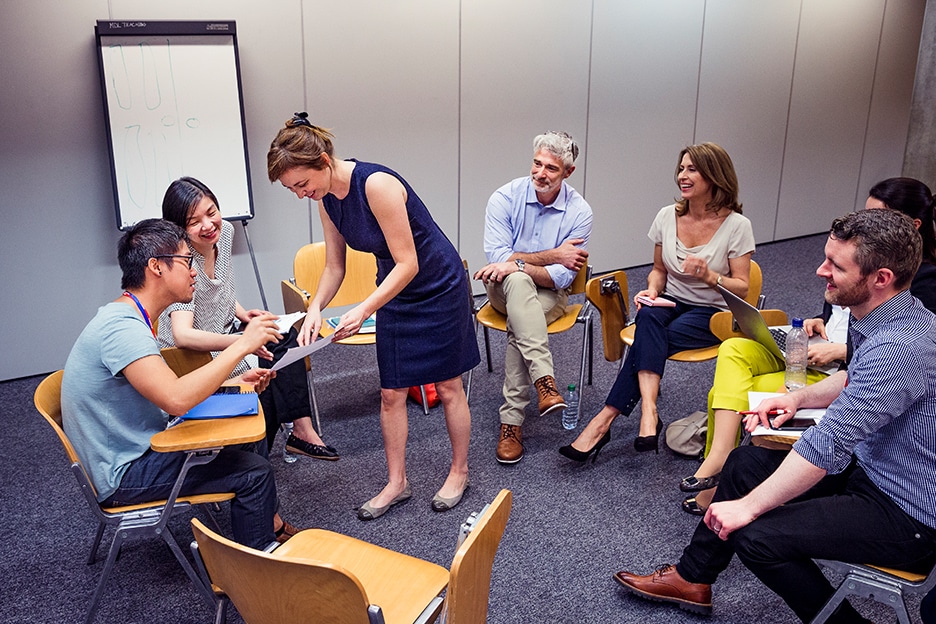Subjects and skills covered
The subjects and skills you learn on Part 1 of the Diploma are consolidated, added to and expanded upon during the intensive Part 2 training through a stimulating variety of lectures, discussions, extensive course manual, practical exercises and the observation of therapy sessions given by HG tutors with real clients.
You will learn the following:
- Constructing effective psychological interventions using RIGAAR™
- Quick rapport building skills – verbal and non-verbal
- Fast, effective information gathering
- How to avoid getting sucked into the patient’s subjective world
- Listening skills, observing verbal and non-verbal cues
- Reflective reframing (active listening with a twist)
- Using language to build expectation and initiate change
- How to establish clear goals with patients and agree strategies for achieving them
- How to discover the client’s psychological and behavioural resources
- Working with the ‘The Observing Self’ concept
- Anxiety management, including how to deal with panic attacks, PTSD, agoraphobia and OCD
- The role of timing in therapy
- Understanding and using the body’s natural relaxation response
- The beneficial effects of relaxation on all forms of harmful emotional arousal
- How to teach patients deep relaxation – a variety of techniques
- Neutralising sub-threshold traumas and ‘molar memories’
- Separating the patient’s core identity from their problem
- Releasing locked-in patterns of trauma and dealing with abreaction
- Further practise in the rewind technique for treating trauma and phobias
- Dissociation and the freeze response – less common reactions to trauma
- Pattern matching: how unconscious processes work
- Key insights from neuroscience – and their practical therapeutic applications
- How to avoid creating false memories
- Stimulating mental and physical healing – the power of attention, information and laughter
- How to teach missing social skills
- The importance of volition, clients have a need to take control of their lives
- How to separate belief and opinion from fact and look directly at people and their situations
- Understanding perception – why most therapy models unwittingly bias how patients are viewed
- Stress and the mind/body system – an holistic view of physical health
- How to stimulate the immune system – language, physiology and healing
- Orienting questions and pattern interventions
- Suicide: assessing the risks and the next steps to take
- Analysis of live demonstrations of psychotherapy
- Transforming the intensity of a patient’s experience
- Depathologising and changing labels
- Using direct and indirect language for therapeutic change
- The metaphorical mind: Why the brain evolved to work with stories – the search for analogy
continued below…
- How to create and tell healing stories
- The role of suggestibility in mind/body healing
- Guided imagery to rehearse new behaviours
- Sleep disorders
- Why people get depressed – the cycle of depression
- How to lift depression quickly and encourage permanent change
- Working with people who self-harm
- Psychological techniques for pain management
- Useful cognitive behavioural (CBT) approaches made even more effective with the APET™ model
- Dealing with difficult relationships and sexual problems
- How to help those who have been physically, sexually or emotionally abused
- Interpersonal relationships – what can go wrong between colleagues, friends and family members and how best to help
- Understanding why we evolved to dream, and the implications for our mental health
- The relationship between dreaming and psychosis
- Creativity, problem solving and brain function
- Treating alcoholism, drug abuse, eating disorders and other compulsive behaviours
- Addiction and the stages of quitting: mobilising motivation – how to free yourself and others from addictive behaviour
- Counter conditioning
- Identifying and working with Asperger’s syndrome
- Left- and right-brained caetextia – what to look out for, the problems it can cause and how best to help
- The importance of empowering clients through psycho-education and teaching missing life skills
- Ethics and professional conduct, including: sexual/relationship issues – discernment; the sick and dying; intractable illness
- Finding the spare capacity in yourself to be effective
- Using outcome measurement as part of effective practice
- The importance of regular supervision
Get in touch
If you’re thinking about taking the Diploma and would like to chat to someone, please call us on +44 (0)1323 811690 or send us an email – we’re always happy to answer your questions.
Find out more
> Diploma Overview
> What our students say about the course
> Reading List
> How to apply for Part 2
> Part 2 Dates & Venue
You might like these
Your route to a professional accredited register




